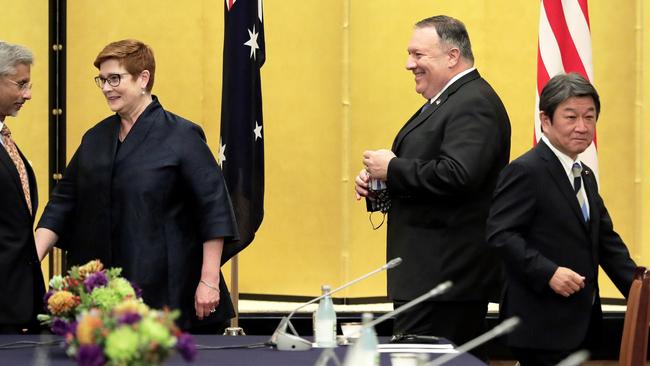Quadrilateral security group’s plan to counter China
Mike Pompeo reveals plan to broaden Quadrilateral Security Dialogue group beyond the US, Japan, India and Australia.

American Secretary of State Mike Pompeo has revealed a plan to elevate and broaden the Quadrilateral Security Dialogue group (QUAD) into a “true security framework”, allowing other countries to join the US, Japan, India and Australia in the group to counter China.
America’s most senior diplomat flagged his desire to further elevate the currently informal grouping while visiting Tokyo for a foreign minister level meeting of Quad.
“Once we’ve institutionalised what we’re doing – the four of us together – we can begin to build out a true security framework,” Mr Pompeo told Nikkei Asia.
Using much more direct language than the other three Quad foreign ministers, Mr Pompeo called the grouping a “fabric” that could “counter the challenge that the Chinese Communist Party presents to all of us.”
Other countries, he suggested, could also become part of that fabric at “the appropriate time.”
The high-level meeting in Tokyo on Tuesday took place despite the COVID-19 outbreak amongst Donald Trump’s inner circle and Beijing’s ire about the gathering.
Japan’s hosting of the Tuesday meeting allowed its new Prime Minister Yoshihide Suga to meet the three visiting foreign ministers, including Mr Pompeo, a Trump confidante who tested negative to a coronavirus test before the meeting.
Mr Pompeo – who following President Trump’s coronavirus diagnosis last week cancelled the South Korean and Mongolian legs of his trip to East Asia – was effusive about Japan’s new leader.
“Prime Minister Suga is a powerful force for good,” said Mr Pompeo, before meeting former Prime Minister Shinzo Abe’s long-serving right-hand man.
“The United States has every reason to believe he will strengthen our enduring alliance in his new role,” he said.
The meeting – a logistical challenge as the coronavirus rages in two of its member states – was only the second time the Quad had taken place at foreign minister level, reflecting the participants heightened concern about Xi Jinping’s increasingly assertive China.
Mr Pompeo’s state department – with a US presidential election less than a month away – was notably blunt when discussing the contents of a 45 minute meeting between the US secretary of state and Australian foreign minister Marise Payne.
They “discussed their shared concerns regarding the People’s Republic of China’s malign activity in the region”, said a US State Department official.
The Australian Foreign Affairs and Trade Department did not release an account of the bilateral meeting with Mr Pompeo.
While Foreign Minister Payne did not mention China directly in her statement on the full Quad meeting, she made clear Mr Xi’s regime was the throughline on the two hour agenda, which was then continued over dinner.
“We emphasised that, especially during a pandemic, it was vital that states work to ease tensions and avoid exacerbating long-standing disputes, work to counter disinformation, and refrain from malicious cyberspace activity,” Foreign Minister Payne said in her statement.
“Ministers reiterated that states cannot assert maritime claims that are inconsistent with international law, particularly the United Nations Convention on the Law of the Sea,” she added.
The Quad meeting – whose subjects included combating disinformation, establishing trusted supply chains for critical technologies and resources, and infrastructure investment in the region – went for over two hours and then continued over dinner.
Beijing has complained about the grouping ever since it was first championed by then Prime Minister Abe in 2007.
China’s foreign ministry last week confirmed its ongoing unease about the grouping in Tokyo, calling the gathering an “exclusive clique”.
“Instead of targeting third parties or undermining third parties’ interests, co-operation should be conducive to mutual understanding and trust between regional countries,” said China’s Foreign Ministry Spokesperson Wang Wenbin.
South Korea – whose relations with Japan became strained during Abe’s second stint as Prime Minister – has also been critical of the grouping.
“We don’t think anything that automatically shuts out, and is exclusive of, the interests of others is a good idea,” said South Korea’s foreign minister Kang Kyung-wha a fortnight ago.
India has long been the Quad’s most reluctant member.
The death in June of 20 Indian soldiers on its disputed mountainous border after a conflict with the People’s Liberation Army has increased unease in New Delhi about its giant neighbour.
“Delhi’s traditional instinct would have been to avoid such a high-profile meeting in the middle of an ongoing crisis lest it provoke China further,” said Tanvi Madan, an expert on Indian foreign policy at the Brookings Institution.
“Its agreement to meet is a sign of change, especially in its perception of approach toward Beijing,” she said.
While Beijing continues to withhold high level communication with Australia, it remains engaged with its neighbouring East Asian American allies.
Chinese Foreign Minister Wang Yi is scheduled to visit Japan in coming weeks to meet with Prime Minister Suga.
Beijing has also signalled that South Korea will be the destination for President Xi’s first overseas trip since the coronavirus outbreak.




To join the conversation, please log in. Don't have an account? Register
Join the conversation, you are commenting as Logout